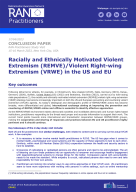Details
- Publication date
- 23 May 2023
- Author
- Directorate-General for Migration and Home Affairs
- Country
- United States
- RAN Publications Topic
- Violent right-wing extremism
Description
Following lethal terror attacks, for example, in Christchurch, New Zealand (2019), Halle, Germany (2019), Hanau, Germany (2020), Buffalo, United States (US) (2022) and Bratislava, Slovakia (2022), carried out by lone-acting male perpetrators ( 1), the racially and ethnically motivated violent extremism (REMVE)/violent right-wing extremism (VRWE) ideology has become increasingly important on both the US and European preventing and countering violent extremism (P/CVE) agenda. As today’s ideological and demographic profile of REMVE/VRWE actors has become broader, more differentiated and global, international exchange aiming at improving the prevention and countering of REMVE/VRWE online and offline is essential to identify effective approaches.
As the REMVE/VRWE environment rejects democratic societies and invalidates democratic and human rights-based institutions, practitioners responding to the threat need proper and accurate information to support their work. The current trend points towards more international and transatlantic cooperation between REMVE/VRWE groups, making the cooperation and sharing of responses and practices between EU and US practitioners highly pertinent and it should continue.
Key takeaways of the 2-day study visit include:
Both US and EU practitioners face similar challenges, both related to content and to carrying out the actual P/CVE work. A few examples:
- It is necessary to better involve mental health practitioners in P/CVE. The US has gaps when it comes to mental health, psychological and social systems and the capacity of these segments to talk to each other. Similarly, within most EU Member States (EU MSs) cooperation between the health and security sectors is hard to establish.
- Grievances of radicalising or radicalised persons are often genuine and need to be acknowledged. The act of listening can turn these problems into an opportunity to empower and encourage healthy engagement with legal/political/social systems to change things for the better. Compassion paired with accountability needs to be made the standard. While empathy is crucial, radicalised persons also need to own and take responsibility for their own actions.
- Practitioners are looking into smarter ways to use online approaches in their P/CVE work. US practitioners seem to have more experience with working with persons in online settings, such as online mentorship provided by formers as well as trained mental health professionals. As underlined during the meeting, the technical infrastructure exists to reach individuals online at a large scale and offer them opportunities to opt in to prevention and exit programmes, whether on- or offline.
- Practitioners agreed that working in a multi-agency approach / in a cross-sectoral manner with, for example, law enforcement, civil society organisations (CSOs), schools, mental health professionals, is needed but not always easy to establish. Many of the US practitioners expressed a wish to have a network system like the EU’s Radicalisation Awareness Network (RAN) that would allow for more collaboration and exchange opportunities in the US and internationally.
- While a lot of knowledge and P/CVE-related resources exist in the US context, they are disjointed and do not yet complement each other.
- The concept of supporting persons in rehabilitation and reintegration after being radicalised/incarcerated differs across the Atlantic. More exchange to learn from each other’s approaches and initiatives could benefit the enhancement of exactly these efforts that play an important role in the prevention of recidivism and sustainable disengagement.
- The work in tertiary prevention and exit work heavily relies on risk and needs assessment. US, Canadian and EU practitioners could benefit from in-depth exchange on these risk and needs assessment tools and practices and exchange lessons learned in this context.
- Countering anti-Semitism in the context of CVE is still one of the most challenging aspects in prevention. It requires not only addressing explicit forms of extremism such as well-known anti-Semitic, white supremacy or right-wing ideologies, but also the underlying dynamics of dehumanisation and justification for violence.

